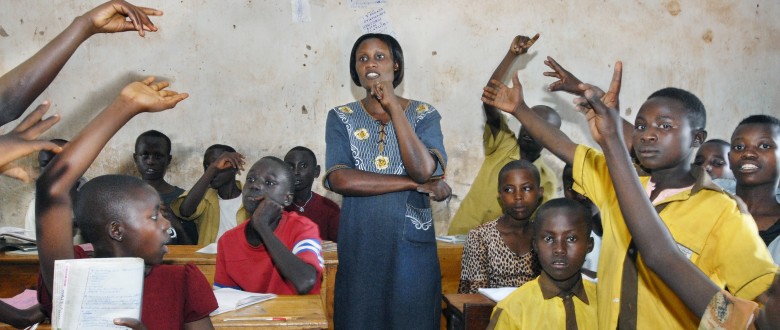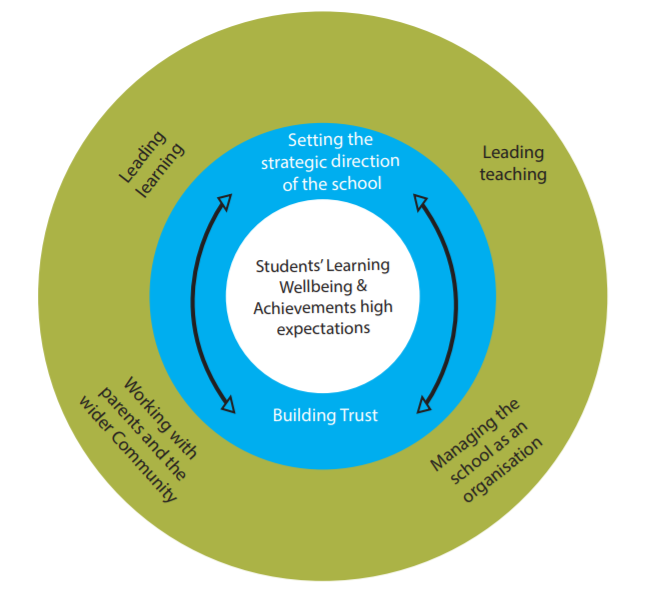
In their latest publication ‘Facing Forward: Schooling for Learning in Africa’, the World Bank and Agence Française de Développement identify ways forward to improve learning outcomes and build the required knowledge capital that will drive social and economic change on the continent. With little evidence from research and practice available, VVOB shares its good practices from working in South Africa, DR Congo, Rwanda and Zambia.
High access, low learning outcomes
The ‘Schooling for Learning in Africa’ report pointedly shows how most sub-Saharan African countries have made tremendous progress towards achieving universal access to basic education. While the gross enrolment rate (GER) of a country like South Africa was already close to 100% in 2000, the GER of countries such as DR Congo grew with 40%.
But challenges remain. In many countries on the continent, including Rwanda, GERs are far above 100%. Often, this is indicative of large and heterogeneous classes, where children of different ages and at different stages of development are learning together.
Considering that: only a small fraction of African children learn in their mother tongue for the recommended 6 years (see page 170 of the report); that learning materials and aids are scarce; and that teachers have limited pedagogical skills; it is not surprising that the publication reports low levels of learning and high levels of formal and informal grade repetition.
The World Bank and Agence Française de Développement identify how to move forward:
- unblock the early grade ‘traffic jam’ (or grade repetition) and ensure progression to lower secondary education,
- set up an efficient teacher management and support system,
- better use of educational budgets, and
- build capacity of education ministries and partners.
Unblocking the early grade ‘traffic jam’
To unblock the traffic jam and stimulate progression towards the secondary level, improving learning outcomes in the early years of education is a priority. In Zambia, VVOB supports grade 3, 4 and 5 pupils to acquire basic skills in literacy and numeracy through “Teaching at the Right Level” (TaRL). This method, first developed by Pratham in India, groups learners according to their performance instead of age and makes use of learner-centered pedagogies rather than traditional chalk-and-talk methods.
Teachers from 1,800 schools in Zambia’s Eastern and Western provinces have been or are being trained to implement the methodology with daily one-hour ‘catch-up’ sessions for young learners outside the school hours. Initial results show that the percentage of learners that can read a simple paragraph or story increased respectively by 7 percentage points (p.p.) (from a base of 29%) and 13 p.p. (from a base of 59%) in Southern and Eastern province after a single term; while the percentage of learners able to subtract two-digit numbers went up by 14 p.p.
Preparing young learners to start schooling pays off as well. In recent years, the Ministry of General Education in Zambia has started investing in Early Childhood Education (ECE). Yet, ECE pedagogies and practice remain poorly understood – many ECE teachers were originally trained to teach at primary level after all. Therefore, VVOB has set up a mentoring programme to acquaint ECE teachers with learning through play pedagogies and with using Early Learning Development Standards that help to monitor learners’ progress and needs, largely to the benefit of these early learners.
Teaching at the Right Level in Zambia
Initial results show that the percentage of learners that can read a simple paragraph or story increased respectively by 7 percentage points (p.p.) (from a base of 29%) and 13 p.p. (from a base of 59%) in Southern and Eastern province after a single term; while the percentage of learners able to subtract two-digit numbers went up by 14 p.p.
Supporting teachers
Teachers’ content knowledge and practices are essential to good learning. According to the report, most African teachers’ knowledge and skills are modest. Both initial teacher education (ITE) and continuous professional development (CPD) have the potential to improve teachers’ knowledge, skills and competences.
In the past years, VVOB has worked hard in Rwanda and South Africa to bridge the transition from ITE to CPD and to support the professional development of new teachers. The focus on this transition period is important because many teachers face substantial challenges at the start of their career that demoralise and demotivate them. If not overcome, this can even cause them to choose a different career path.
VVOB’s support to teachers centers on four elements.
- First of all, we seek to improve the curricula of ITE programmes. Together with the College of Education of the University of Rwanda, we have revised the ITE curriculum in Rwanda to align it with the country’s competence-based curriculum and to introduce pre-service teachers to more participative and interactive teaching methods – see our work in DR Congo too. In South Africa, we are working together with five universities (North West University, University of Witwatersrand, the University of Free State, Fort Hare University and the Central University of Technology) to infuse and mainstream inclusive pedagogies in their teacher training curricula.
- Second, we focus on mentoring of new teachers. Mentors - whether experienced colleagues, teacher training tutors or education officials – help teachers translate what they learnt during ITE into practice and to overcome potential challenges they encounter while doing so.
- But to many teachers, tutors or officials, mentoring does not come naturally. Therefore, thirdly, VVOB partners with teacher colleges to set up certificate courses and to deliver trainings that help mentors to become good listeners and observers, and to develop the necessary skills to provide teachers with constructive feedback.
- Lastly, we encourage effective school leadership that motivates teachers to invest in their professional development and that creates a positive school climate in which teachers can thrive.
Effective school leadership
VVOB is strongly committed to effective school leadership. Throughout the years, we have built a lot of experience in developing specific courses targeted at school leaders.
In DR Congo, our course is specifically tailored to leaders heading secondary technical schools. In South Africa, we focus on school leaders at the primary level, while school leaders of both the primary and secondary level can get involved in the Rwandan diploma course, reaching more than 600 school leaders in 2018 alone.
In the latter two countries, school leaders continue to develop professionally through participation in professional learning communities (PLCs). School leaders come together to discuss challenges and share experiences to subsequently identify tailored solutions. In South Africa, we also organise PLCs at the teacher level. Research by the Education Development Trust shows that Rwandan school leaders who participated in PLCs became more confident and competent as leaders and fostered more collaborative school environments.
But PLCs require a good facilitator. Therefore, VVOB trains sector education officers (SEOs) in Rwanda and circuit managers in South Africa. Action research in South Africa shows that these trainings help circuit managers to encourage collaborative and enquiry-based learning rather than taking up a prescriptive and instructing role.
Under the impulse of VVOB, effective school leadership has even become a pillar of Rwanda’s education sector strategic plan (2018-2023). And, we also contributed to the development of the five standards of school leadership, including (1) setting the school’s strategic direction, (2) leading in learning, (3) leading in teaching, (4) engaging parents and the community, and (5) managing the school as an organization. The last standard includes the better use of educational resources.

Capacity development
To keep our projects running once VVOB is no longer involved, capacity development is key. To this end, VVOB maintains good working relations with the respective ministries of education in Rwanda, DR Congo, South Africa and Zambia.
In the initial phases of our projects, VVOB usually takes the lead providing training and practical and technical expertise. However, as the project evolves, the ministry and local education authorities increasingly take the front seat. In Zambia, for instance, VVOB provides training to district and zonal education officers to mentor and monitor schools that are implementing Teaching at the Right Level. Mentored by VVOB staff in the early stages, these officers will eventually take on full responsibility and will train their new colleagues in a similar fashion. Providing intense support at the start, we are also gradually diminishing our support to the Ministry and Provincial Education Support teams in terms of planning, implementation and progress reporting, promoting ownership and sustainability. Because of our approach, VVOB has established long-lasting and impactful partnerships.
Sharing best practices
More and more, VVOB measures the impact of our programmes. In Zambia, progress of learning outcomes in numeracy and literacy is meticulously documented. In Rwanda, we have teamed up with The Research Base to start a rapid-cycle evaluation to gather multi-year evidence on the effect of mentoring and monitoring new teachers. Insights gained in the early evaluations enable us to adapt the implementation of the programme and to maximise impact at the end of the day. In South Africa, we have taken a more qualitative approach documenting the impact of our SEO-training programme through action research.
The objective is always the same: collecting evidence to share best practices, inform decision-making and – ultimately – improve the learning outcomes of ever more children to build the required knowledge capital that will drive social and economic change in Africa – as aspired by the ‘Facing Forward’ publication.




